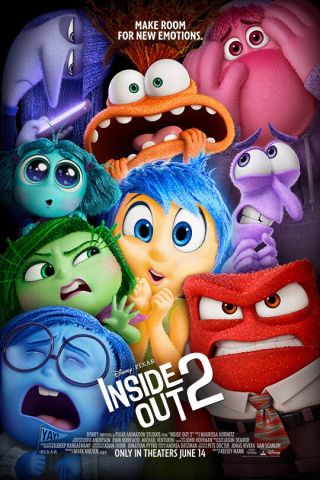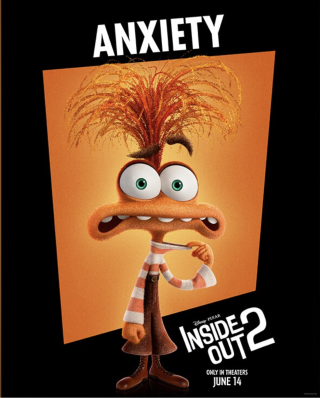Child Development
Pixar’s Inside Out 2: Sense of Self, Emotions, and Memories
Personal Perspective: The movie brings a sense of self to Riley's inner life.
Updated June 15, 2024 Reviewed by Ray Parker

It was either serendipity or the “master plan” that Inside Out 2 was released on June 14, 2024, just after I’d attended my 35th college and 40th high school reunions, and I’d put the finishing touches on my essay about the latter reunion (see references). The film so powerfully paralleled my sprawling lookback that I thought the filmmakers had gotten inside my head and used me for source material. And I stayed through the very last end credit to find the names of my mentors and friends, psychologists Dacher Keltner and Kristin Neff. There’s also a humorous Easter egg following the credits—stay.
Keltner is a social psychologist and founding director of the Greater Good Science Center at the University of California, Berkeley. He studied emotions under Paul Ekman (who is also credited in the film) and has written books on awe and human goodness. Neff is the pioneering cofounder of the Center for Mindful Self Compassion (along with Christopher Germer), and her work on tending to suffering with mindfulness, shared humanity, and self-kindness has been validated with nearly 2,000 research trials to date. They’d gotten in my head over the years and helped me and my patients enormously, so of course, their insights were foundational for this film, Pete Docter’s sequel to his Academy Award-winning 2015 Inside Out. Many of my patients talked a lot about that first film, and I’m sure the sequel will resonate with many more.
In a nutshell, Inside Out 2 continues the journey inside now-13-year-old Riley Anderson’s mind (voiced by Kensington Tallman) as she’s just about to head to high school and feeling all the feels. The film takes place on one weekend of her life as she skates into a hockey camp for teen girls. Will she make her “goals,” figuratively and literally? Just who will she turn out to be under the stresses of puberty, ambitions, and her newest and most volatile emotion, "Anxiety" (voiced by Maya Hawke)?
"Joy" (Amy Poehler) and "Sadness" (Phyllis Smith) return, but they are quickly displaced along with their cohort and sent to “The Vault” of secrets while a new set of emotions runs the control board in "Headquarters." The emotions will be very familiar to us all, but I don’t want to spoil the surprise and alchemy that will undoubtedly unfold in your mind and “Headquarters” as the film triggers memories from your childhood.

Riley acquires a nascent sense of self, which is bombarded by all the contents of her mind and experience. Ultimately, her sense of self requires compassion to acquire complexity, nuance, depth, and stability. It requires relationship, so there’s a lot of "Outside In" here as well, perhaps not as much as I give credence to, but it’s there nonetheless.
I highly recommend Inside Out 2 to all the proverbial “children of all ages.” The film brought tears to my eyes as I reflected on all my emotions and thoughts of the previous two weeks on 57 years, my reunions, and my deep cringes and buried memories, as I wrote about in that essay (see below).
I had some quibbles with the first film (see references). In 2015, I wrote:
Marvin Minsky and others would probably also wonder whether there’s an HQ per se. In The Society of Mind (1986) he outlined his theories of how mind emerges from brain. He proposed that many smaller processes, called “agents” become interdependent to form “societies”, and intelligence emerges, along with identity, personality, etc. Emotions, memories, knowledge, rules (other peoples and your own)–all intertwine in complex formulations…
I’m actually partial to a view of mind and personhood captured perfectly by an episode of Star Trek: The Next Generation where Captain Picard shows off an artifact acquired from an alien civilization. It’s a bust of a person that contains many people within it. It’s similar in concept to artist Tenzing Rigdol’s Hollywood Buddha, and the Ubuntu proverb “people become people through other people” (and my own “we are who happens to us and what we do with the happening.”)…
[The] 'stories between us' are perhaps more powerful than anything our individual HQ’s could arrange. It’s beyond society of mind. It’s relationship, family, community, or society itself, with all their heartaches, hopes, and potentials.
I had two immediate minor quibbles with Inside Out 2.
- While the mechanisms of the mind look concrete and discrete on screen, in reality, they can be quite fluid and dynamic, with the buried emotions and memories of the “unconscious” secretly running the show and all elements lapping into each other like waves of a great ocean of self, flowing with the ocean of other-selves as well. Even emotions are not discrete and separate and are arguably more multiform and varied than the ones depicted in the film.
- Also, there is not simply a narrative sense of self, as depicted, but an experiential sense of self, grounded in moment-to-moment experience, that allows us to have a necessary dialogue with narratives. (For more on a sense of self, see my article in the references.)
But it’s important to look within and seek the interior. Inside Out 2 helps viewers do just that and is a brilliant companion piece to our always-running movie of the mind.
Enjoy.
© 2024 Ravi Chandra, M.D., D.F.A.P.A.
References
Chandra R. MOSF 19.3: Faces/Places: Late Night In-Flight Thoughts Returning from my 40th High School Reunion at Cranbrook Kingswood. East Wind eZine, June 15, 2024
Chandra R. Headquarters? What Headquarters? Behind Pixar's Inside Out. Psychology Today, June 22, 2015 https://www.psychologytoday.com/intl/blog/the-pacific-heart/201506/headquarters-what-headquarters-behind-pixars-inside-out
Chandra R. Cultivating Sense of Self to Cope With Trauma and Life. Psychology Today, October 2, 2023


